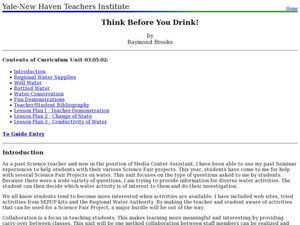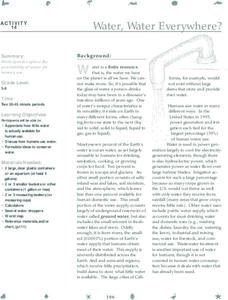Learning Games Lab
Water Sampling
Scientific procedures ensure valid data and valid results. Use a water sampling interactive to teach learners the procedures for collecting water samples. The interactive takes users through the process step-by-step with notes of...
Curated OER
Quarter Conservation
Here is another in the interesting series of lessons that use the special State Quarters as a learning tool. This one uses the California State Quarter. During this lesson, pupils learn the many ways they can conserve natural resources...
San Francisco Public Utilities Commission
Recycled Water: A Smart Way to Reuse Water
Learn about wastewater and recycled water with a science reading activity. After learners finish a two-page passage about conserving the water supply, they answer six comprehension questions about what they have read.
San Francisco Public Utilities Commission
What is Drought? No Rain, No Water
How can climate change affect our water supply? Have kids read a passage about the water cycle and water conservation, which includes six questions that challenge them to use context clues.
Curated OER
Water Pollution Prevention and Conservation
Students examine how to conserve water. They also discover how to prevent water pollution. They examine the Earth's water distribution as well.
California Academy of Science
Sustainable Water Solutions: Weighing the Pros and Cons
Switching indoor water fixtures to low flow reduces water usage by more than 45 percent. This and other solutions to reduce water usage have both pros and cons. Scholars view videos of different solutions, discuss them in small groups,...
National Wildlife Federation
How Do You Feel About Water?
Less than one percent of the water on Earth is usable in people's homes. As pupils consider this fact, they reflect on their own water usage before designing a survey to collect information on water usage by others. They then analyze...
Curated OER
Think Before You Drink
Students explore the different water issues facing society today. For this environmental science lesson, students research about water treatment methods. They brainstorm ways to conserve water.
Cal Recycle
Conserving Natural Resources
Trying to plan an engaging elementary science unit on natural resources? Conserve your energy! This five-part series of lessons and hands-on activities has exactly what you need to teach young scholars about the importance of conservation.
Curated OER
Water
The water cycle is explained in five steps in this PowerPoint. Individual slides also show color graphics of how we use water at play, at work, and at home. Tasks are given throughout the presentation. One of them asks learners to color...
Library of Congress
The Conservation Movement at a Crossroads: The Hetch Hetchy Controversy
Should wilderness areas be preserved or managed? Class members examine primary source documents, including lecture notes, articles, essays and congressional records to better understand the Hetch Hetchy controversy that created a split...
Teach Engineering
Efficiency of a Water Heating System
Tired of waiting for hot water? Groups of three determine the efficiency of an electric water-heating device. They calculate the amount of energy it takes to heat the water and the theoretical amount of energy required to heat the water....
Purdue University
Healthy Water, Happy Home
Clear water does not mean clean water. A collaborative lesson has groups play a board game to identify sources of water pollution and develop strategies for improving water quality. Their investigations include reference to the water...
US Geological Survey
Water, Water, Everywhere?
Less than one percent of the earth's water is available for human use. A hands-on activity models the phenomenon for young scientists. Beginning with a specific volume of water, learners remove water that correlates to the percent of...
EngageNY
Gathering Information about Water Management: Assessing and Reading Internet Sources, Day 3
Water is life! Using the informative resource, scholars first read two informational articles about water management in agriculture. Then, they use a Venn diagram to contrast the different types of evidence authors use to support a...
EngageNY
Forming a Research-Based Claim: Stakeholder Chart on Better Agricultural Water Management
How can industries manage water more sustainably? Building on the previous activity, scholars explore the topic by creating a stakeholder chart for agricultural water management. Next, they participate in the World Café discussion...
EngageNY
Analyzing Interaction: Categories of Water Management in The Big Thirst
It's puzzle time! Pupils participate in a jigsaw activity to discuss the various uses of water, including personal, agricultural, and industrial uses. They also conduct a close reading of The Big Thirst by Charles Fishman and answer...
EngageNY
Contrasting Authors’ Use of Evidence: Bottled Water
Apples to oranges, Dasani to Aquafina. Using a Venn diagram, scholars contrast two authors' use of evidence on the topic of bottled water. Additionally, they continue reading Charles Fishman's The Big Thirst and answering text-dependent...
EngageNY
Gathering Information about Water Management: Assessing and Reading Internet Sources, Day 2
Accuracy, credibility, timeliness ... it's time to act on source reliability! Pupils continue conducting Internet research, selecting two questions about water management from their researcher's notebooks that they want to explore...
Curated OER
"Wet" Your Appetite: Conserving Water
Students investigate how water is utilized in producing food. In this agriculture lesson, students examine how much water goes into the creation of their daily menu. Students create a new menu that can conserve water and cut their water...
Curated OER
"Water Has Many Uses" Mini-unit
Learners understand the importance of water as a resource in our lives. In this water mini-unit students recognize that not all countries have water available as we do. Learners discuss and explain a plan for responsibilities of getting...
Curated OER
Uses of Water
Students plan for a water shortage in their area. In this water lesson, students analyze water usage and plan and share a reduction plan. Groups share their results and calculate the averages. Students analyze how water is wasted. ...
Baylor College
How Can We Find Out What Is in Water?
Using paper chromatography, water watchers discover that several substances might be dissolved even though they aren't visible. For this case, you will prepare a mixture of three different food colorings for them to experiment with. A...
American Chemical Society
The Energy Efficiency of Heating Water
Can a small change in laboratory procedures save energy? Scholars test three different methods for heating water in a science lab. Then, they calculate the energy efficiency for each and compare them to determine which uses the least...

























